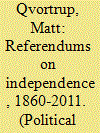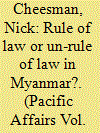|
|
|
Sort Order |
|
|
|
Items / Page
|
|
|
|
|
|
|
| Srl | Item |
| 1 |
ID:
166678


|
|
|
|
|
| Summary/Abstract |
Fear is an integral part of terrorism. Fighting fear can thus be a crucial part of counterterrorist policies. In the case of terrorism, citizens look to the state for protection. Yet, most studies of terrorist fear emphasize individual-level factors. We lack studies that link fear to features of the state, especially whether democratic states are capable of reducing fear among its citizens. Our study aims to fill part of this research gap by asking whether democratic government reduces or increases fear of terrorism. We find that there is substantial cross-country variance in citizens’ fear of terrorism. The results suggest that fear is more widespread among citizens in non-democratic countries compared to citizens in democratic countries. Actual exposure to terrorist attacks has no impact on citizens’ fear of terrorism when we account for whether the country is a democracy or not. Hence, democratic government displays resilience towards fear mongering.
|
|
|
|
|
|
|
|
|
|
|
|
|
|
|
|
| 2 |
ID:
047893


|
|
|
|
|
| Publication |
Houndmills, Macmillan Press Ltd., 1996.
|
| Description |
xvii, 242p.
|
| Standard Number |
0333642716
|
|
|
|
|
|
|
|
|
|
|
|
Copies: C:1/I:0,R:0,Q:0
Circulation
| Accession# | Call# | Current Location | Status | Policy | Location |
| 043737 | 338.98/MOR 043737 | Main | On Shelf | General | |
|
|
|
|
| 3 |
ID:
155218


|
|
|
|
|
| Summary/Abstract |
This article is a summation of the emphases I place in my teaching about intelligence, both in academic settings and in courses presented to government and commercial clients. The main goal is to demystify and deromanticize intelligence, to present it as a normal function of government and one that has moral and ethical standards and can exist compatibly within a democratic government. The article also discusses suggested course readings, some successful term paper topics and the concept of graduate intelligence courses as a type of professional training. The article also notes some themes emphasized in courses on training new analysts in their required skill sets.
|
|
|
|
|
|
|
|
|
|
|
|
|
|
|
|
| 4 |
ID:
130951


|
|
|
|
|
| Publication |
2014.
|
| Summary/Abstract |
There have been more than 50 independence referendums since the middle of the 19th Century when Texas, Virginia and Tennessee-albeit unsuccessfully-voted to leave the USA. A handful of plebiscites were held in each decade after 1945, but most independence referendums were held after the break-down of communism. Most have resulted in majorities for independence. However, such plebiscites have been rare in countries with established systems of democratic government and the results may not be a fair reflection of the views of the voters. When referendums have been held in democratic countries, they have often resulted in a no-vote (though Montenegro is an exception to the rule). Referendums have on a few occasions resulted in the exacerbation of ethnic conflict, such as in Bosnia-Herzegovina and in East Timor. But generally speaking referendums are not correlated with civil war; indeed, war resulted in only 13 percent of the cases.
|
|
|
|
|
|
|
|
|
|
|
|
|
|
|
|
| 5 |
ID:
171331


|
|
|
|
|
| Summary/Abstract |
Epistocratic arrangements are widely rejected because there will be reasonable disagreement about which citizens count as epistemically superior and an epistemically superior subset of citizens may be biased in ways that undermine their ability to generate superior political outcomes. The upshot is supposed to be that systems of democratic government are preferable because they refuse to allow some citizens to rule over others. We show that this approach is doubly unsatisfactory: although representative democracy cannot be defended as a form of government that prevents some citizens from ruling over others, it can be defended as a special form of epistocracy. We demonstrate that well-designed representative democracies can, through treatment and selection mechanisms, bring forth an especially competent set of individuals to make public policy, even while circumventing the standard objections to epistocratic rule. This has implications for the justification of representative democracy and questions of institutional design.
|
|
|
|
|
|
|
|
|
|
|
|
|
|
|
|
| 6 |
ID:
092199


|
|
|
|
|
| Publication |
2009-2010.
|
| Summary/Abstract |
The rhetorical force of the rule of law is acknowledged through official discourse in Myanmar just as it is in other countries across Asia and around the world. Given that Myanmar manifestly does not conform to substantive models of the rule of law, which are associated with democratic government and individual liberties, might it conform to a minimalist one? Is there in Myanmar a thin rule of law to which the military government can lay claim, one compatible even with grave abuses of human rights? Or is there only "un-rule of law"? Beginning with some theoretical concerns, this article passes briefly through a review of law and rule-of-law rhetoric in the country's modern history before arriving at the present day. It recounts a court case arising from a recent historic event, the September 2007 antigovernment protests, to query whether or not a thin rule of law can, in Myanmar at least, be said to coexist with authoritarian rule. It concludes that it cannot. But if the army in Myanmar has succeeded in overwhelming the courts at cost of the rule of law, ironically in doing this it may also have averted a worse scenario, one in which the denial of fundamental rights for which it is well known could be even greater than at present.
|
|
|
|
|
|
|
|
|
|
|
|
|
|
|
|
|
|
|
|
|